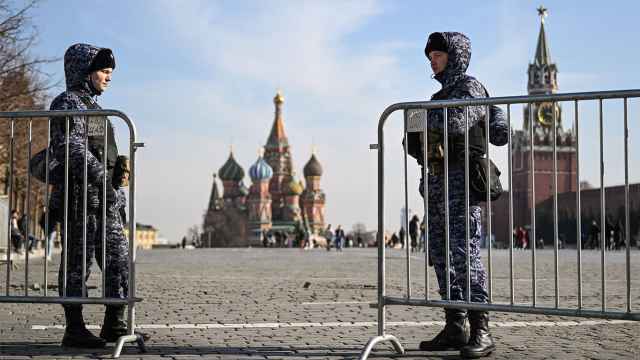The State Duma has passed a police reform bill in its second and third final readings, rejecting most amendments proposed by minority parties and the public, including a ban on beating women.
The majority United Russia party on Friday supported all the recommendations of the Duma's Security Committee, a decision that critics said effectively cripples a bill that the Kremlin introduced last year with much fanfare after public discussion.
Among the amendments discarded by the committee were measures to increase public and parliamentary control over the police and to ban the force from the private security market, where it is currently a key player.
Critics said the bill's biggest change would be the renaming of the force from the current, Soviet-era "militia" to "police."
"We are not getting any reforms," said Gennady Gudkov, deputy head of the Just Russia faction.
He said the bill effectively enlarges the powers of the police force, returning functions that earlier had been dropped at the request of President Dmitry Medvedev, Interfax reported.
At the same time, the bill will not provide police officers with the specific rules needed to help root out corruption, said Anton Belyakov, a deputy also with A Just Russia, Interfax reported. In particular, the Duma rejected amendments that would have banned police from breaking into people's homes without a court order and from ignoring orders of superiors when they contradict the law, the report said.
Some restrictions were imposed on police, however, including a ban on the use of rubber batons and tear gas against peaceful demonstrators, even at unsanctioned gatherings, unless they disrupt traffic, communications or the work of an organization, RIA-Novosti reported.
But the Duma rejected an amendment that would have banned the police from beating women as discriminatory against men, Duma Deputy Speaker Oleg Morozov said, Interfax reported.
Several deputies applauded when the beating ban was introduced to the debate, but Vladimir Kolesnikov, deputy head of the Security Committee and a United Russia member, responded that women have killed dozens as suicide bombers in recent years, including 88 people on two airplanes in August 2004.
"Those who clapped, think for a second," he said. "Only recently such women — if one can even call them that — bombed several planes."
The bill keeps in place a provision from the current law that says police cannot use force on women with "visible signs of pregnancy."
Within the course of two hours Friday, the lawmakers considered 550 amendments to the bill and rejected 406 of them, Interfax said.
The bill, which now needs to be approved by the Federation Council before Medvedev can sign it into law, is expected to take effect on March 1, RIA-Novosti said.
Police briefly detained five activists with the opposition group Left Front as they held one-man pickets against the police bill in front of the Duma on Friday, Interfax reported. The activists face fines of up to 2,500 rubles ($80).
A Message from The Moscow Times:
Dear readers,
We are facing unprecedented challenges. Russia's Prosecutor General's Office has designated The Moscow Times as an "undesirable" organization, criminalizing our work and putting our staff at risk of prosecution. This follows our earlier unjust labeling as a "foreign agent."
These actions are direct attempts to silence independent journalism in Russia. The authorities claim our work "discredits the decisions of the Russian leadership." We see things differently: we strive to provide accurate, unbiased reporting on Russia.
We, the journalists of The Moscow Times, refuse to be silenced. But to continue our work, we need your help.
Your support, no matter how small, makes a world of difference. If you can, please support us monthly starting from just $2. It's quick to set up, and every contribution makes a significant impact.
By supporting The Moscow Times, you're defending open, independent journalism in the face of repression. Thank you for standing with us.
Remind me later.





